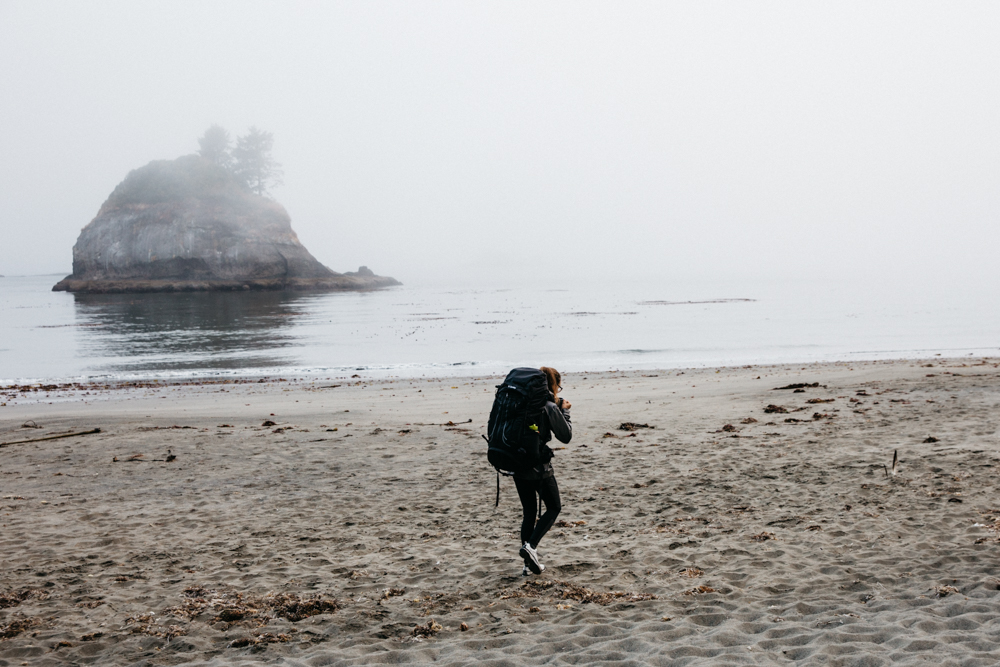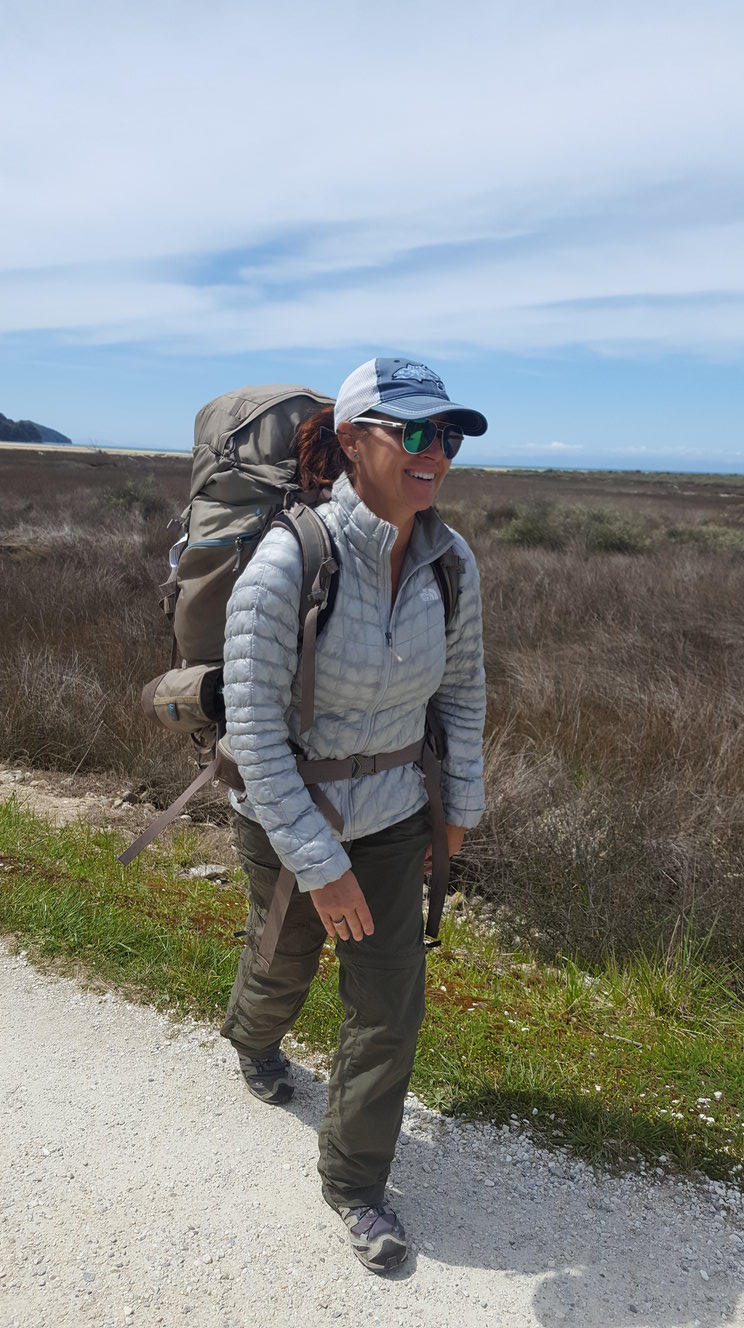Episode 40: Confidence

Episode 40: Confidence
 This week’s episode is brought to you by Oru Kayak. Thank you to them for the support!
This week’s episode is brought to you by Oru Kayak. Thank you to them for the support!
Banner image by Gale Straub
On the trail, is confidence good, bad, or something in between? We talk with Lisa Michelle, a woman who lost her hiking partner tragically while hiking solo. We discover how Lisa is able to reconcile still doing what she loves when there’s risk involved.
From host Gale Straub:
A couple of months ago, I received an essay from her in consideration of publication on She Explores. The title, “How To Survive Overconfidence” caught my eye, but it was the content that held me. It’s an essay that holds more questions than answers. It’s filled with anger and grief and bewilderment at the loss of Lisa’s dear hiking partner. At its core, the essay asks the questions: “How can you explain losing your good friend? How can you reconcile doing what you love – hiking solo – when hiking solo is what your friend was doing when she died?”
Lisa wrote that essay looking for answers. She doesn’t know the full details of her friend’s death (allegedly she fell while hiking in a foreign country), but she knows that her friend felt most confident (maybe too confident) in her hiking boots with a pack on. But is it OK for Lisa to still feel confident?
About a year ago, She Explores published a podcast episode called “Alone on the Trail” – it’s episode #8 – and it was all about hiking and camping solo. Overall, the episode was centered around a theme of encouragement. That’s it’s ok to branch out by yourself and hit the trail by yourself. But it’s not always that simple. When Lisa sent me her essay, I was reminded of the intricacies of hiking solo – of our various thresholds for risk, of all the potential danger on the trail. I knew I had to talk to Lisa.
Read Lisa’s essay below. See more of Lisa Michelle’s work on her portfolio site.
Subscribe to She Explores podcast via Apple Podcasts, Stitcher, and Google Play.
Music by Josh Woodward, Kai Engel, Evan Schaeffer, and Soft & Furious via freemusicarchive.org
“How to Survive Overconfidence”
By Lisa Michelle
I screamed, “Don’t go, don’t go!” My mouth was wide open but no sound escaped. Sarah stood at the edge of a craggy precipice, looked back and saw me. I was crying. “Don’t go. You’re gonna die!” Still, she couldn’t hear me, but her smile and nod suggested she knew. She stepped forward and slipped away.
I woke from the dream filled with sorrow and tears. A pain like something clawing in my chest, something that wanted out. It’s been almost a year since Sarah’s “fall” and I constantly catch myself concocting a variety of scenarios pertaining to her death.
Sarah and I met while solo-hiking the 165-mile Tahoe Rim Trail. The trail loops high above Lake Tahoe in the Sierra and Carson Range of California and Nevada. Her epic smile was contagious under a blonde bob as she approached with what had to be the biggest backpack I’d ever seen on someone under five-feet. When she asked, “Hey, how’s it goin’?” she truly wanted to know and wouldn’t let me off with a bullshit answer like, “Fine.”
Under the skeleton of a giant juniper and a high-noon sun, we rested on warm granite. Traded snacks and stories while a bald eagle drifted in a cloudless sky. Sarah told me about her near-death experience after falling in a river in Patagonia and her thru-hike of the John Muir Trail, something I’ve wanted to do for years. “My dad died the same day I came off the trail. He’d been sick a while,” she said with tears in her eyes, then explained that her grandfather had come from Lebanon and that her father had always wanted to see the old country, but never did. “Someday I’ll go.” She smiled and shrugged and before I knew it two hours had passed. I gave her my number and we hurried off in opposite directions.
“Where you fine ladies off to today?” The dude had a face like a stoned toad, humorless with fake-sleepy eyes.
“We’re hiking the Chesler Trail, then camping in Devil’s Pocket.” We were in Canyonlands, Utah, and Sarah shared our plans with a guy living in his rusted-out ’70s van. A guy who constantly stroked his greasy comb-over and eyed us as we finalized our packs.
“I’ll see you there. I’m trippin’ out to The Pocket, too.” He nodded vigorously, a cigarette hanging under his top lip. Torn loafers and black slacks had me doubting his true desire to hike. Briefly, I wondered if I was being judgmental. No. I would not have shared our plans with a stranger, even if he or she didn’t smell like burnt oil.
“Sarah?” I interrupted from the backseat of the truck. “Can you help me?”
“What’s up?” She came around the driver’s side, poked her head in.
“Why would you tell that guy where we’re going? He’s all kinds ‘a creepy. If he doesn’t murder or rape us, or both, he’ll rip off everything in the truck.”
“No he won’t.” Sarah seemed sure, and grabbed her pack. She lived in a much better world than I, where nothing bad ever happens. We were opposites, the proverbial yin and yang that made our friendship work so well. Odds are good that individual life experiences contributed to our differing views of “shit happens.” I carry a gun or pepper spray when I hike alone. Sarah never carried any self-protection while soloing; thought it was ridiculous. She also refused to carry a bear can or bag while hiking in bear country since she never had an encounter while hiking the John Muir Trail for 21 days.
Our trip to southern Utah was a last minute excursion conceived because I had just read Edward Abbey’s Desert Solitaire and wouldn’t shut up about it. “October is the best time of year to go, less crowded.” I said. “Your Kirkwood job doesn’t start until November.” As if she didn’t know. “Two can travel so much cheaper.” We were both broke. Then, I hit her with the ultimate best reason to do anything. “You could die tomorrow.”
We couldn’t find Devil’s Pocket. Sarah lost the map, then remarked, “There’s no way you can get lost out here.” I went from being irritated to full-blown pissed. Though I didn’t have the statistics to back it up, I was sure people got lost, probably died out here. Odds were good that more than a few hikers found themselves on the wrong side of the solid canyon wall that ran as far as I could see. I felt we were in the midst of a series of mistakes that would be presented on the evening news as: “Here’s where the girls made their first mistake…”
Days earlier we had hiked much riskier trails in Zion. Angels Landing and Emerald Pools hold the distinction of most fatal falls due to steep drop-offs and The Narrows winds through inescapable slot canyons drowning hikers when flash floods hit. We sloshed through the icy Virgin River in The Narrows for two days. Camped on a ledge between towering granite walls, we watched a glaring full moon glide across a slice of midnight sky and validated to each other the importance of witnessing something so majestic.
Whether we were lost or not, we hadn’t found Devil’s Pocket after six hours of hiking. I suggested we head back to the truck before dark. Sarah reluctantly agreed.
Later that night, I released my rant in my journal. The words would later haunt me:
Sarah is so overconfident. She’s gonna get herself into trouble one of these days.
Sarah was stoked when she called to tell me she had finally booked a thru-hike of the Lebanon Mountain Trail, a 293 mile trek that would take place in April, 2016. She would fulfill her father’s wish and spread his ashes along the way while searching for distant relatives.
“Are you sure it’s safe?” was my first question. I was unaware that the U.S. Department of State had issue a warning to U.S. citizens to avoid travel to Lebanon because of the threats of terrorism, armed clashes, kidnappings, and outbreaks of violence.
“Oh yeah, it’ll be fine.” She would be traveling with a group from the Lebanon Mountain Trail Association. Then, she offered to join me on my hike of the John Muir Trail that August. Life was good.
Sarah wore her brilliant smile and her father’s hat in the What’s App photos she sent from Lebanon. Her happiness was tangible. The last message I received was on May 6, 2016. I began to worry about a week later when I hadn’t received a single reply, but put it off as Sarah being out of range. On May 18, 2016, I recognized Sarah’s email address in my mailbox and eagerly opened it. It wasn’t from Sarah, it was from her sister. She said Sarah had had a hiking accident; “she slipped and fell.” So she’s in a hospital in Lebanon, I thought. “Tragically she did not survive.” I reread the sickening sentence through watery burning eyes without breathing. In the space of a heartbeat my friend was gone.
The Lebanon Mountain Trail Association’s (LMTA) Facebook page offered a vague scenario. Sarah had completed the trail and decided to hike back to the village of Jezzine on her own. They simply said she had an “unfortunate fall.” Details of her death are still unavailable and the LMTA has not responded to my many attempts at contact. The U.S. Embassy Beirut is unable to release personal information and suggests I contact the LMTA.
Sarah wasn’t an extreme risk-taker who hucked cliffs in avalanche terrain, or freeclimbed El Capitan. No wingsuits, or base jumping where you understand and accept the dangers involved. Not knowing the truth about her death is beyond frustrating, but her real misstep was when she decided to hike alone in Lebanon. Lebanon is not a place for men or women to solo-hike. After almost a year of coming to terms with Sarah’s death, I believe she suffered from the overconfidence effect which measures the difference between what people really know and what they think they know.
Overconfidence doesn’t only affect extreme risk-takers, it affects most of us. We systematically overestimate our knowledge and our abilities on a massive scale–from stock market performance to believing that our marriage is special and will last forever–when statistics prove otherwise. In surveys, 84 percent of Frenchmen estimate that they are above-average lovers (Taleb). Remember American Idol and the devastated contestants who truly believed they were talented?
Ohio State University researchers created a cognitive model that explains why overconfidence occurs. They called the model the Assess-Search-Construct (ASC) model. According to the model, there are three basic steps people go through while making a choice. First, we assess all options and assume the right option (our ‘first guess’) based on the greatest feeling of familiarity. Second, we search our memory for facts that relate to the first guess. Then, based on the facts retrieved from memory, we build an explanation as to why that first guess is true. With that logic, Sarah wanted to return to Jezzine. She likely backed up that option with the feeling of familiarity based on previously hiking the trail, although with a group. Then, if she did consider the dangers of hiking alone in Lebanon, she assured herself that her first choice was correct because she had hiked alone before and nothing had ever happened. The thought process of the overconfidence effect.
“Be aware that it is human nature to overestimate your knowledge. And with all plans, favor the pessimistic scenario. This way, you have a chance of judging the situation somewhat realistically,” says Rolf Dobelli MBA, Ph.D. “The Art of Thinking Clearly.”
While rare and unpredictable deaths happened every day, Sarah’s death was a revelation. I lost the desire to hike solo, something I truly enjoy. I cancelled my hike of the John Muir Trail that summer. When the snow came, I questioned my safety in the backcountry and refused to cross a frozen lake I’d comfortably crossed previous winters. No longer surfed spots that were considered sharky. The realization of my overconfidence hasn’t kept me tucked away at home, but it has caused me to examine my decision-making process.
Deciding to solo-hike the John Muir Trail this summer was complicated. I questioned friends who have thru-hiked the trail. One friend says, “You’ll be fine;” the other, “Do not go alone.” Attempting to judge the solo situation realistically, I defended my desire with the fact that as the trail will be full of hikers, I wouldn’t always be alone. Also, if I don’t go alone, I don’t go; none of my friends are able to hike for nearly a month. Was I building explanations as the ASC model suggests? Just being aware of the overconfidence effect allowed me to stop and thoroughly consider the risks of soloing the JMT.
I bought a SPOT. The small device provides a GPS tracking service in case of emergencies and possibly could have saved Sarah.
The belief that a person’s wealth is determined by the value of their experiences not their possessions is a concept Sarah and I lived by and the deciding factor. My JMT journey will no doubt be extremely challenging mentally and physically, but with Sarah’s help, I’ll smile at each hiker and ask “Hey, how’s it going?” And I’ll wait for a real answer because none of us are just “fine.”

Lisa in New Zealand
Links/Resources Mentioned in this Episode:
So sorry for the loss of your wonderful friend…. ❤